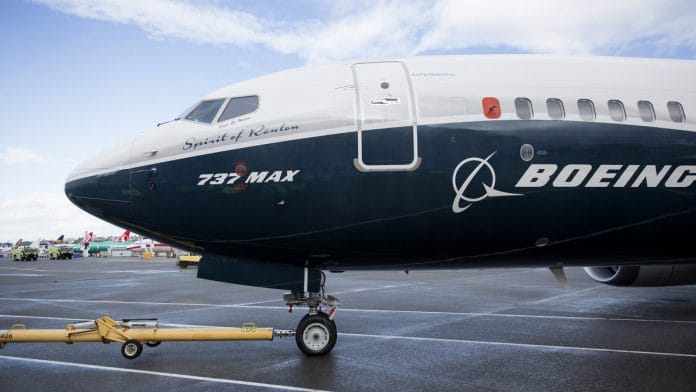As another deadline for the return of Boeing Co.’s troubled 737 Max slips out of reach, the aerospace company doesn’t appear to have any better handle on its messaging now than it did when this crisis started more than a year ago.
Federal Aviation Administration Administrator Stephen Dickson told CNBC on Wednesday that the agency won’t complete the necessary approvals for the Max’s return until 2020. The plane has been grounded since March following the second of two fatal crashes linked to a flight-control software system. That’s a notable contrast to Boeing’s last official timing update, which called for the FAA to give it the green light to start shipping stockpiled jets by December. Regulators weren’t expected to certify new pilot-training requirements until several weeks later and airlines wouldn’t be able to fly the Max until they did, but beginning the process of clearing out the glut of undelivered jets would help Boeing manage its cash crunch and avoid further production cuts.
At the time, I wondered why the FAA would be willing to bifurcate the certification process in order to throw Boeing a bone like this. It would appear from Dickson’s comments that he isn’t on board with this timeline. “Boeing’s plan is not the FAA’s plan,” Dickson said on CNBC. That puts Boeing in the awkward position of once again being on the wrong side of conservatism.
The company has repeatedly moved the goal posts for the Max’s return. Boeing initially said it was on track to have the final paperwork on planned software fixes in to the FAA by late March and hosted a junket just weeks after the second crash to sell the fixes to customers and the media.
Setbacks ensued, but Boeing told customers it was targeting FAA approval of the software fix as early as the third week of May and an ungrounding around mid-July, according to a Reuters report in April. More setbacks ensued, so Boeing said in July that it expected to have all recertification materials in to the FAA by September with the goal of having the grounding lifted in October – even as the Wall Street Journal reported that regulators and pilot union leaders at the time believed 2020 was more likely. Airline executives have cast their own doubts on Boeing’s timetables, with Gary Kelly, CEO of Southwest Airlines Co. — the largest Max customer — saying last month that he wasn’t “highly confident about a mid-December ungrounding date.”
Clearly, no one has had a crystal ball when it comes to the Max crisis, but the past year has taught us the conservative approach is the prudent one, particularly as regulators contend with the damage done to their own reputations and the overall perception of safety in the aviation industry. And it is telling that after all this time, Boeing is still finding itself the one with the most aggressive assumptions.
It’s a natural instinct to want to motivate your employees and soothe your shareholders. But amid persistent accusations that Boeing prioritized profits over safety in the development of the Max and rushed the initial rollout, it’s stunning that the company remains blind to the optics of deadlines that repeatedly prove overly optimistic or give the impression of special treatment from the FAA.
Boeing has made changes to insulate its engineers from the company’s financial concerns and offered frequent sweeping commitments to safety. That said, CEO Dennis Muilenburg wasn’t willing or wasn’t able to detail specific changes to the company’s relationship with the FAA that he would support when he testified before Congress in October. I remain unconvinced that the right incentives are in place to ensure Boeing makes the kind of deep-rooted changes that are necessary, but the FAA’s unwillingness to be corralled into following the company’s timelines is a positive start.-Bloomberg
Also read: Former Boeing manager who pointed out production issues with 737 Max to testify at hearing






